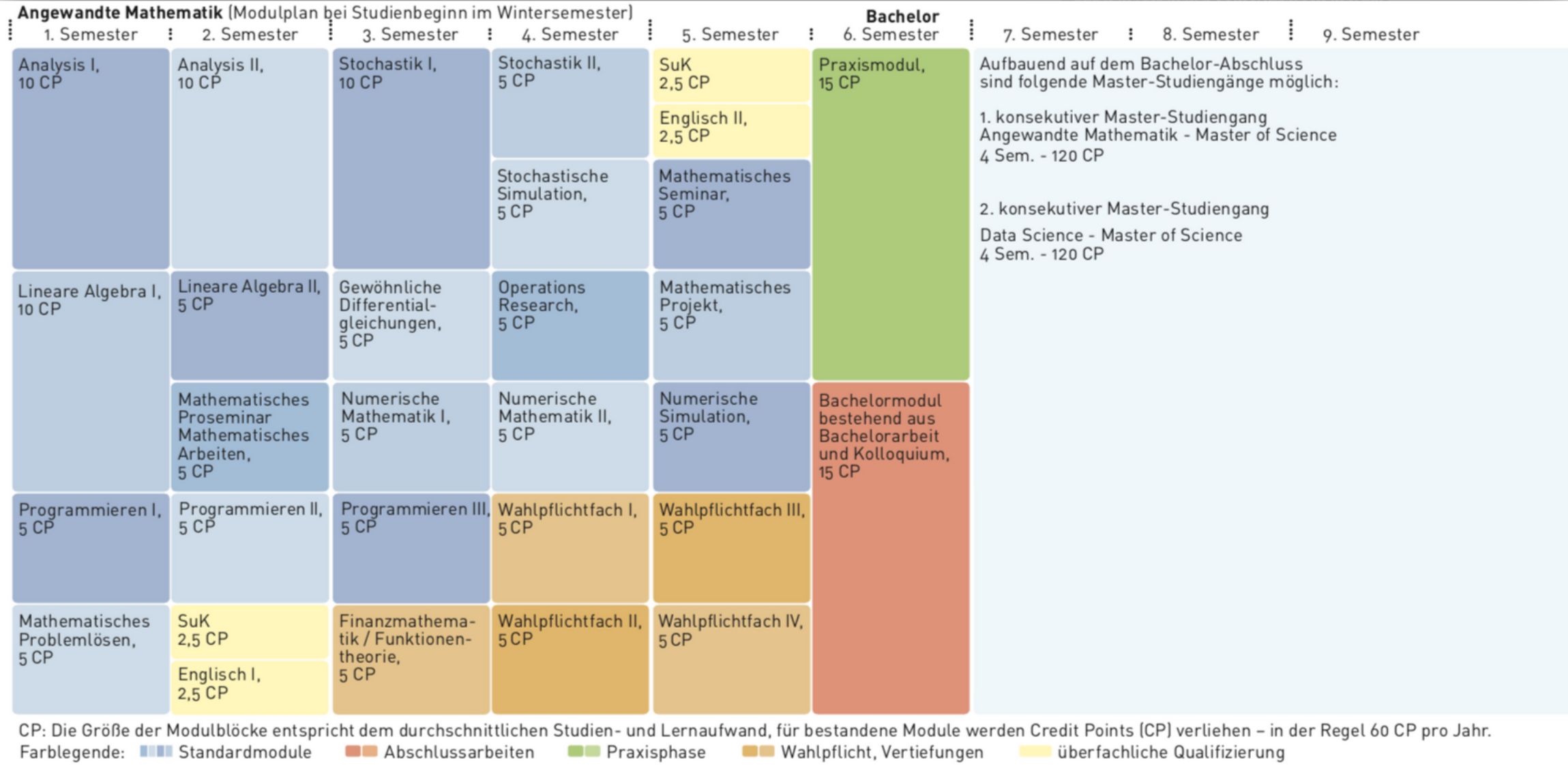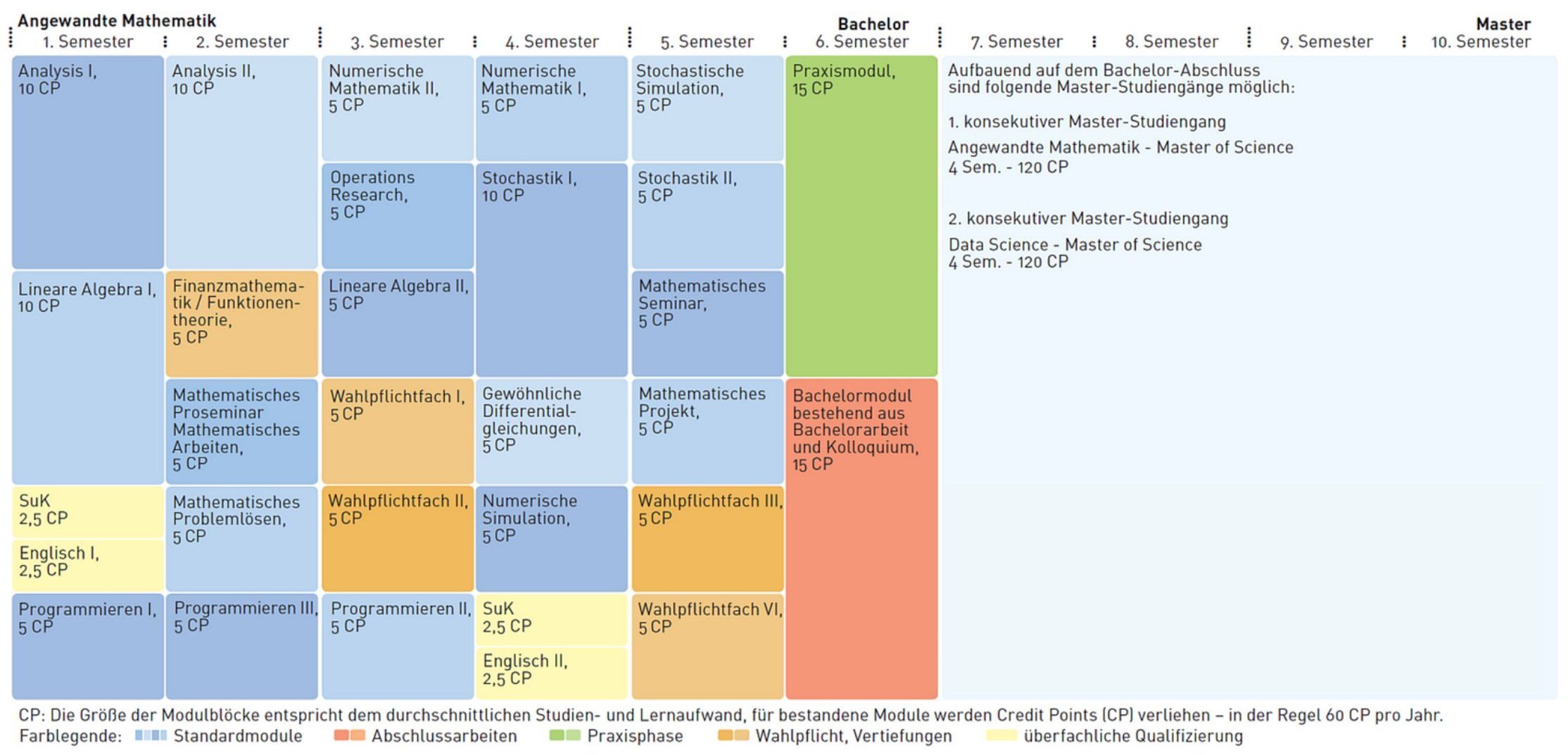Applied Mathematics (Bachelor)
Are you interested in financial mathematics, actuarial mathematics, operations research and stochastics or technomathematics? Then you've come to the right place!
We provide a broad, practice-oriented university education for these and related fields of work, including the opportunity to specialize in business mathematics or technomathematics.
Graduates of our Applied Mathematics (B.Sc.) course can work in many sectors, e.g. industrial companies, banks, the public sector, insurance companies, research institutes, IT services or management consultancies. You can find more information on the fields of work on the Applied Mathematics homepage.
Title | Applied Mathematics |
Degree | Bachelor of Science (B. Sc.) |
Standard period of study | 6 semesters |
Start of studies | Winter and summer semester |
Internship | Internship not required |
Admission | No admission restrictions, NC-free course. Admission requirements include general higher education entrance qualification, subject-specific higher education entrance qualification, entrance qualification for universities of applied sciences. Information on vocational qualifications can be found under Study without Abitur |
Languages | Courses are held in German. |
You can easily assess your personal suitability for the course based on your school performance in mathematics. But having fun with mathematics is just as important! Are you enthusiastic about tricky problems and enjoy finding ingenious solutions? Then you have exactly the right attitude.
The course ends with a Bachelor's thesis in the sixth semester. You can then start your career or switch to one of the consecutive Master's degree courses in Applied Mathematics and Data Science or to a Master's degree course at another university.
We build on the school curriculum of the upper school and teach the mathematical basics and programming skills in the first semesters. From the fourth semester at the latest, elective subjects are added depending on your interests. Study modules in the form of lectures, exercises and project work provide the qualifications and skills. An overview can be found in the course flyer or the first semester brochure. The course also includes a practical work phase in the sixth semester and concludes with an independent Bachelor's thesis.
Click on the module plans to enlarge.
Examination regulations 2018 (in the version updated in 2023)
- Examination regulations Bachelor of Applied Mathematics
- Module handbook Bachelor of Applied Mathematics
The official documents of the current version of the BBPO and the module handbook were published in the Hochschulanzeiger 2024.
The first point of contact for most questions about studying is the Student Service Center, or SSC for short. In addition to general student counseling and information on the details of the application process, advice on the organization or financing of studies is also available here. Student Service Center (SSC)
If you have any questions about the study program, please contact Prof. März.
In addition, a lot of useful information has been compiled in the First semester brochure (only in german).
Students in the Bachelor's program in Applied Mathematics can transfer to the duale study model Applied Mathematics until the beginning of their third semester.
Once you have started your studies, these are probably the most important pages:
The link my.h-da (is also stored under Quicklinks) takes you to the university information system for students. Here you can
- print out all the certificates you need yourself (study certificates, Bafög certificate and the receipt for the fees you have paid).
- view information about your exams and grades
- register for or deregister from exams.
- register for courses.
- view your course schedule and the course catalog.
- compile your individual timetable.
At www.h-da.de/tutorials you will find brief instructions for registering for exams, viewing grades, and much more.
Semester dates: Here you can find the dates for exams and events for all courses of study. This page can also be accessed directly via quicklinks.
Timetables: This page contains the links to the PDFs with the current timetables for all degree programs.
Change of degree program. Who recognizes achievements in applied mathematics?
If you change degree course or transfer from another university, you may be able to have any introductory modules you have passed recognized. This allows you to be placed in a higher semester. The Chair of the Examination Board is responsible for the recognition of credits in the Bachelor of Applied Mathematics degree program Prof. Christine Bach
You can find further information under:
Focus on Technomathematics and Business Mathematics
In the course of your studies, you can specialize in the fields of technomathematics or business mathematics through a relevantly chosen mathematical seminar, a corresponding mathematical project and a suitable bachelor thesis.
Furthermore, there is the possibility to complete the practical phase (BPP) as well as the bachelor thesis in appropriate companies or institutions (cooperation partners). Of course, the professors also assign suitable topics for Bachelor theses according to the specialization.
If at least 30 CP have been completed from the modules assigned to a focus, this can be shown on the certificate. The details are regulated by §9 of the BBPO of the Bachelor's program Applied Mathematics as well as the corresponding module handbook.
In addition, recurring elective courses serve the specialization:
In addition, these elective subjects are always supplemented by current offerings, some of them from external sources.
We look forward to hearing from you!
Student Advisory Service
Opening hours secretariat | |
|---|---|
Mon: | Appointment by arrangement |
Tue: | Appointment by arrangement |
Wed: | 9 am - 2 pm Open consultation hours |
Thu:: | 9 am - 2 pm Open consultation hours |
Fri: | Appointment by arrangement |


